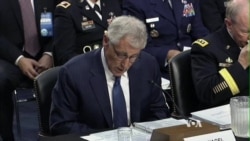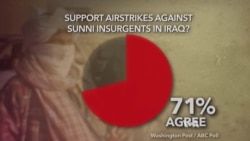This anniversary of the September 11, 2001 attacks that killed nearly 3,000 U.S. citizens was supposed to be different. America was poised to transition out of a war era for the first time in 13 years.
But now, the president has ordered the military back in.
President Barack Obama announced Wednesday night the U.S. military is sending 475 additional troops to Iraq. Most of them will be posted in U.S. command headquarters in Baghdad. About 125 of them will man intelligence and surveillance aircraft. Another 150 of them will advise and assist Iraqi troops. In all, more than 1,600 U.S. military personnel will be in the country, costing U.S. taxpayers an average of more than $7.5 million each day.
U.S. officials and analysts say attacking a force that has grown to the size of the Islamic State will take time. It is expected to be a multi-year project that will likely carry into the next presidency.
“The threat that we’re facing from the Islamic State has grown to the point where there are no simple answers, where they can’t be destroyed or defeated in just a few months,” says Elliot Abrams, a senior fellow at the Council on Foreign Relations who served as deputy assistant to the president and deputy national security adviser to U.S. President George W. Bush.
Experts have been trying to analyze whether the long fight is winnable without combat troops on the ground. But Abrams says the fight can be won precisely because Islamic State militants are behaving differently from their al-Qaida predecessors.
“The Islamic State has made a great mistake that al-Qaida never made: they are behaving like a government. That is, they want to control territory. They don’t want, you know, just a little hideout where they can plot,” Abrams said. “They want to govern cities and provinces. That makes them very vulnerable to a military conflict and to American airpower.”
The military is relying on allies, including the Iraqi forces and the Syrian opposition, to bring the fight to Islamic extremists on the ground. The president has turned to Congress to quickly approve $500 million to fund the training and equipping of Syrian opposition fighters, but Pentagon Spokesman Rear Admiral John Kirby says the recipients of this potential funding have not yet been verified.
“For the $500 million program that we are trying to get approved, there’s a vetting process that has to accompany that, and that process hasn’t occurred,” Kirby said Thursday.
As for forces inside Iraq, some Americans this week are wondering why their military is returning just two years after their exit. The military points to the former Iraqi government, with Kirby blaming former Iraqi Prime Minister Nouri al-Maliki for mismanaging the military through “poor political choices and leadership decisions, not properly manning, not properly resourcing, and not properly training” their military once the United States was out of Iraq.
“They’ve got a new government now, a new unity government,” Kirby said. “All the signs are pointing to a much more inclusive political process that’s responsive to all Iraqis to include a more responsible management of Iraqi security forces.”
Elliot Abrams says an improved Iraqi government is clearly better for the United States and its allies, but he takes issue with the president relying on the new government in Baghdad.
“I think the way the president has approached this, frankly, just doesn’t compute, in saying that we’re not going to help them defeat ISIS [Islamic State] until they get a government in place,” Abrams said. “If it’s critical for us to defeat ISIS, if it matters to the national security of the United State then we’ve got to do it, whether there’s a terrific government in Baghdad or a terrible government in Baghdad.”
Related video report "Americans' Reaction Mixed on Obama Strategy for Islamic State Militants"






